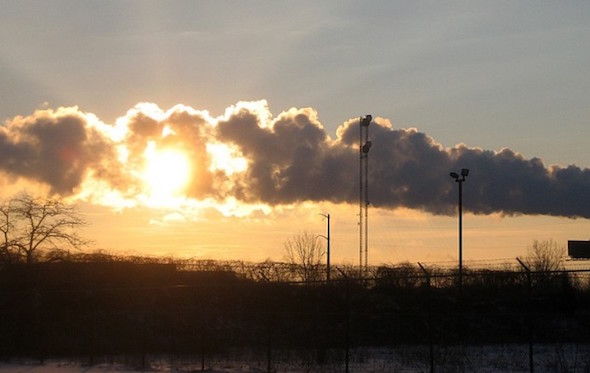Look at Climate’s Past Shows Warming Could Be Much Greater Than Originally Thought
Reconstruction of climate events long before the Ice Ages shows that failure to reduce greenhouse gas emissions could eventually lead to temperatures rising by up to 10 degrees.
By Tim Radford / Climate News Network

Greenhouse gases are now being released at a faster rate than during the thermal maximum 56 million years ago. (Eric Schmuttenmaer via Flickr)
This piece first appeared at Climate News Network.
LONDON — If the distant past is anything to go by, then climate scientists may have under-estimated the hazards of greenhouse gases, and future global warming could be a lot worse than anybody thought.
The calculation rests on two things. One is a detailed reconstruction of rising greenhouse gas concentrations and an interlude of dramatic warming 56 million years ago. The other involves an almost metaphysical concept called “climate sensitivity” — the degree of warming to be expected as carbon dioxide concentrations in the atmosphere double.
It isn’t a simple calculation. There are all sorts of possible feedbacks that might damp this sensitivity or amplify it, but the climate rule of thumb right now is that it means a 3°C rise.
And on the evidence — reported in Geophysical Research Letters — of the sequence of events deep in the past, it could be a lot more.
“The research shows that climate sensitivity was higher during the past global warm climate than in the current climate.” says Gary Shaffer, an expert in Earth system models, and professor at the University of Magallanes Chile and the Niels Bohr Institute in Copenhagen. “This is bad news for humanity as greater climate sensitivity from warming will further amplify the warming.”
Future projection
Studies of this kind depend on a number of difficult-to-establish details. One is the evidence from the past, which is always open to re-interpretation. The other is projection into the future, which is necessarily based on assumptions about change that, by definition, cannot be tested.
But the reasoning behind the latest research goes like this: long before the Ice Ages, during the Palaeocene-Eocene Thermal Maximum (PETM), there was a massive release of carbon into the atmosphere and a period of warming. Researchers have in various ways tried to use these lessons from the past as a way of understanding the present era.
“This is bad news for humanity as greater
climate sensitivity from warming will
further amplify the warming”
At the time, the global average temperature was about 10°C warmer than today, and it increased by another 5°C during the episode.
So the researchers looked at all the tell-tale data available from minerals and isotopes to try to reconstruct the carbon dioxide concentrations in the atmosphere before and during the thermal maximum, and then tried to see if the climate sensitivity had changed.
They found that it had increased from 4.5°C to 5.1°C, so it could be that climate sensitivity actually goes up with average temperature.
Fossil fuel reserves
“Our results show that the amount of carbon that drove the PETM warming was about the same amount as the current ‘easily accessible’ fossil fuel reserves of about 4,000 billion tons,” Professor Shaffer says.
“But the warming that would result from adding such large amounts of carbon to the climate system would be much greater today than during the PETM, and could reach up to 10 degrees.”
He says that carbon dioxide levels 56 million years ago were much higher than at present. On the other hand, greenhouse gases are being released by humans at a faster rate than the levels during the thermal maximum.
“If we then also take into account the fact that climate sensitivity increases with the temperature, it means that it is all the more urgent to limit global warming as soon as possible by reducing the man-made emissions of greenhouse gases.”
Tim Radford, a founding editor of Climate News Network, worked for The Guardian for 32 years, for most of that time as science editor. He has been covering climate change since 1988.
Your support matters…Independent journalism is under threat and overshadowed by heavily funded mainstream media.
You can help level the playing field. Become a member.
Your tax-deductible contribution keeps us digging beneath the headlines to give you thought-provoking, investigative reporting and analysis that unearths what's really happening- without compromise.
Give today to support our courageous, independent journalists.






You need to be a supporter to comment.
There are currently no responses to this article.
Be the first to respond.